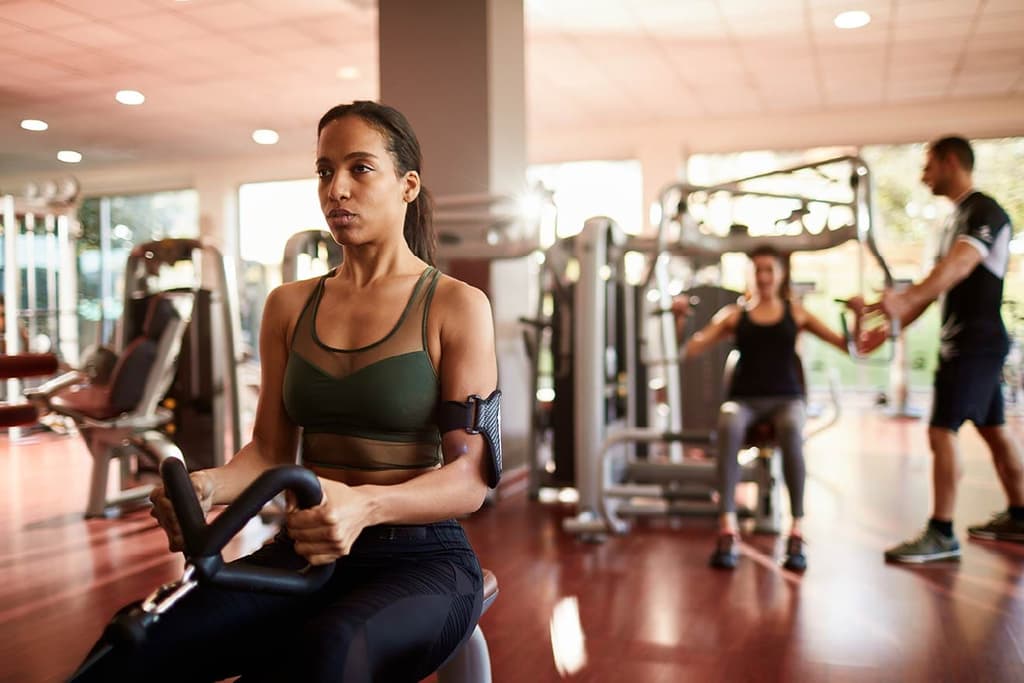Over One-Third of Americans Avoid Working Out Due to Gymtimidation
Our survey of over 1,000 Americans revealed that nearly half of Americans avoid working out due to gym anxiety. Uncover more facts about gymtimidation here.
Imagine this: You've finally mustered up the courage to join a gym, but as you walk through those doors, your heart starts to pound. Are people judging your outfit? Will you look clueless trying to navigate the equipment? These anxieties are more common than you might think.
For some, the weight room, cardio machines, and group fitness studio is a safe space, a sanctuary. But for many others, it’s a source of anxiety. The feeling of self-doubt, stress, and an overwhelming sense of fear in a fitness setting is known as gymtimidation, which prevents countless people from enjoying the benefits of exercise. In fact, our recent survey revealed that more than 40% of Americans avoid working out due to gym anxiety.
To better understand gymtimidation and help people overcome their fears, we conducted a comprehensive survey exploring the causes, impacts, and solutions. Let’s take a closer look at what people are saying about gymtimidation and how they can overcome it.
Key Takeaways:
- Nearly 50% of people feel like others are watching and criticizing them at the gym.
- Over 40% of people have experienced feelings of intimidation or self-consciousness at the gym for over five years.
- Nearly 1 in 4 males believe having a workout buddy would make them feel more comfortable exercising at a gym.
- Almost 25% of people believe finding a less crowded gym would make them feel more comfortable working out.
More Than 40% of People Avoid Working Out Due to Gymtimidation
We asked respondents whether or not they feel intimidated at the gym, and nearly half said they avoid working out due to gymtimidation.
Our data shows that women are more affected by gym anxiety, feeling more self-conscious than men when working out. This anxiety peaks for those ages 45 to 60. The fear of judgment for their appearance or fitness level is the biggest culprit, affecting many gymgoers for years.
This highlights the need for more inclusive gym environments where everyone feels welcome and supported, regardless of their metabolic age, gender identity, or fitness level.
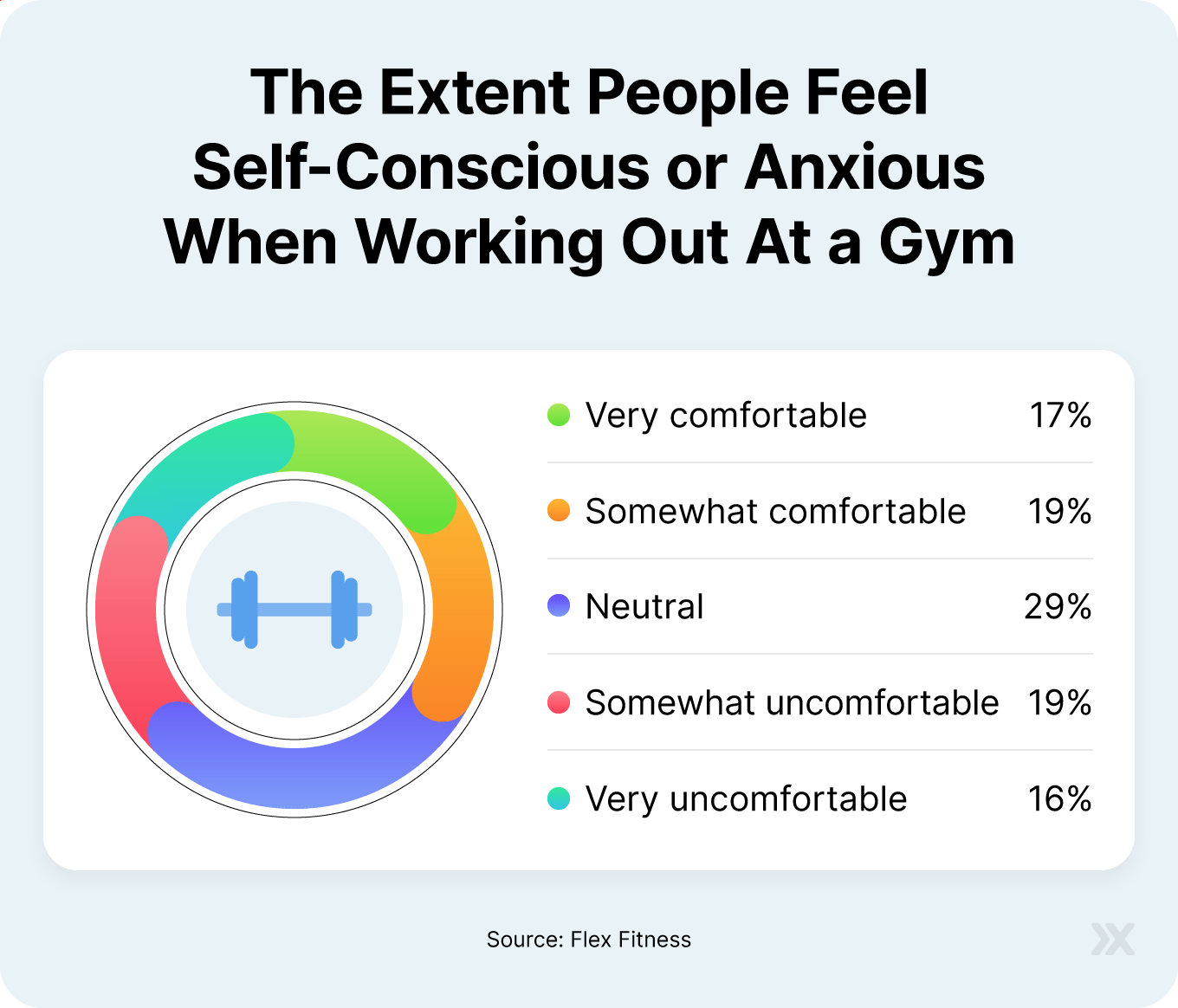
Nearly Half of People Feel Like They’re Being Watched and Criticized at the Gym
It's no secret that the gym can be intimidating. Turns out, a lot of us are worried about being judged — in fact, the biggest fear for many people is being judged on how they look or their fitness level. Our data reveals that it affects women and those between 45 and 60 years old the most.
And it's not just a fleeting feeling, either. Nearly 50% of people feel like they're being watched and criticized at the gym. Even younger people feel it, with nearly 40% of millennials and Gen Z saying they feel judged based on their appearance or fitness level.
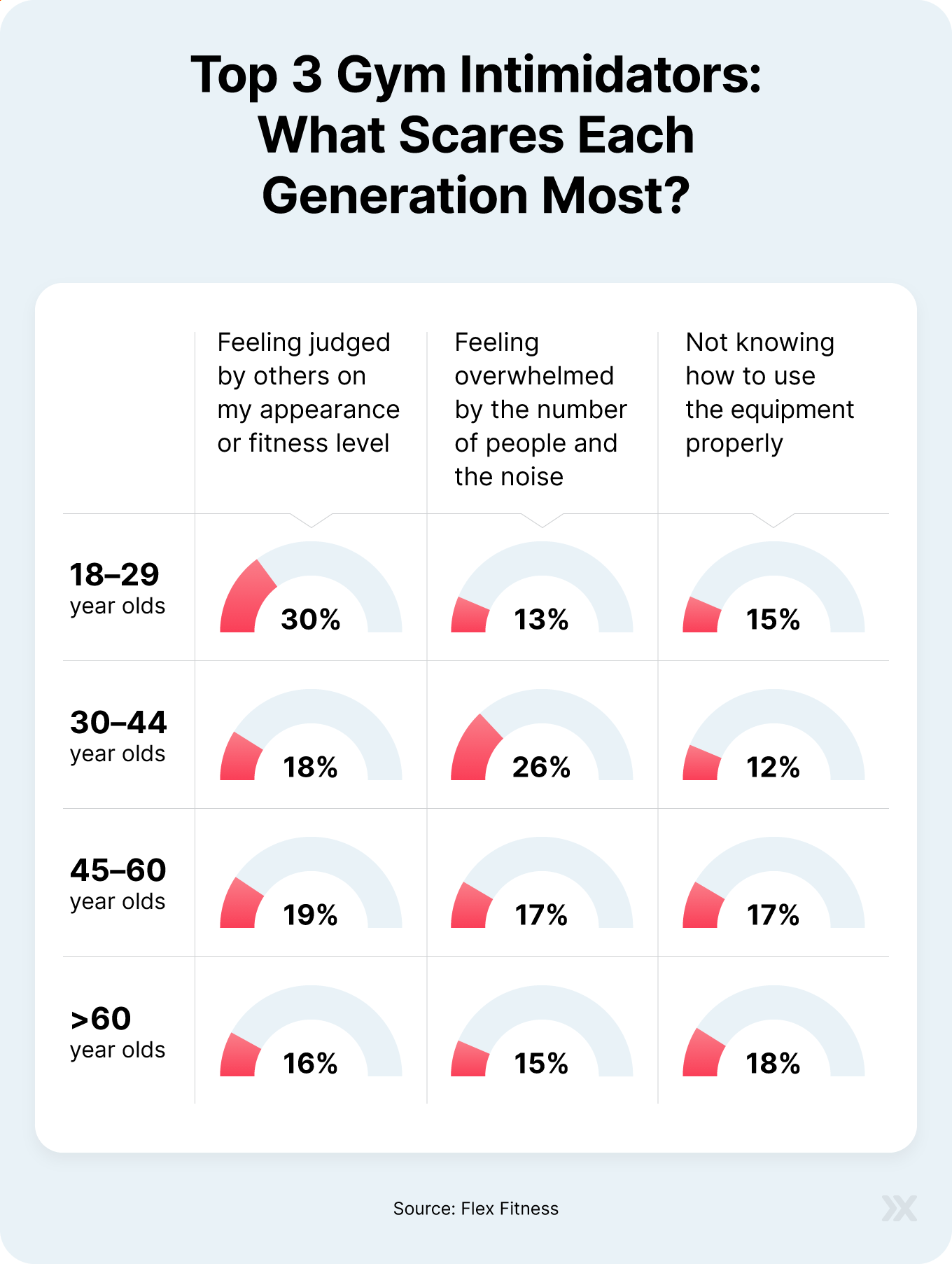
Feelings of Intimation at the Gym Isn’t New
Our data reveals that it's not just a passing phase for many people. Over 40% of people have grappled with these feelings of intimidation or self-consciousness at the gym for over five years! This suggests that for many, the gym can be a source of anxiety that persists over time, not just a fleeting feeling of discomfort when you start your fitness journey.
Interestingly, this long-term gymtimidation seems to be particularly prevalent among women and middle-aged Americans. Over half of females and over half of individuals ages 45-60 have experienced these feelings for over five years.
This highlights the need for gyms to create welcoming and inclusive environments where everyone feels comfortable. Gyms can create a more inviting environment through staff training, community building, and diverse representation. It's time to ditch the intimidation and make fitness accessible to all.
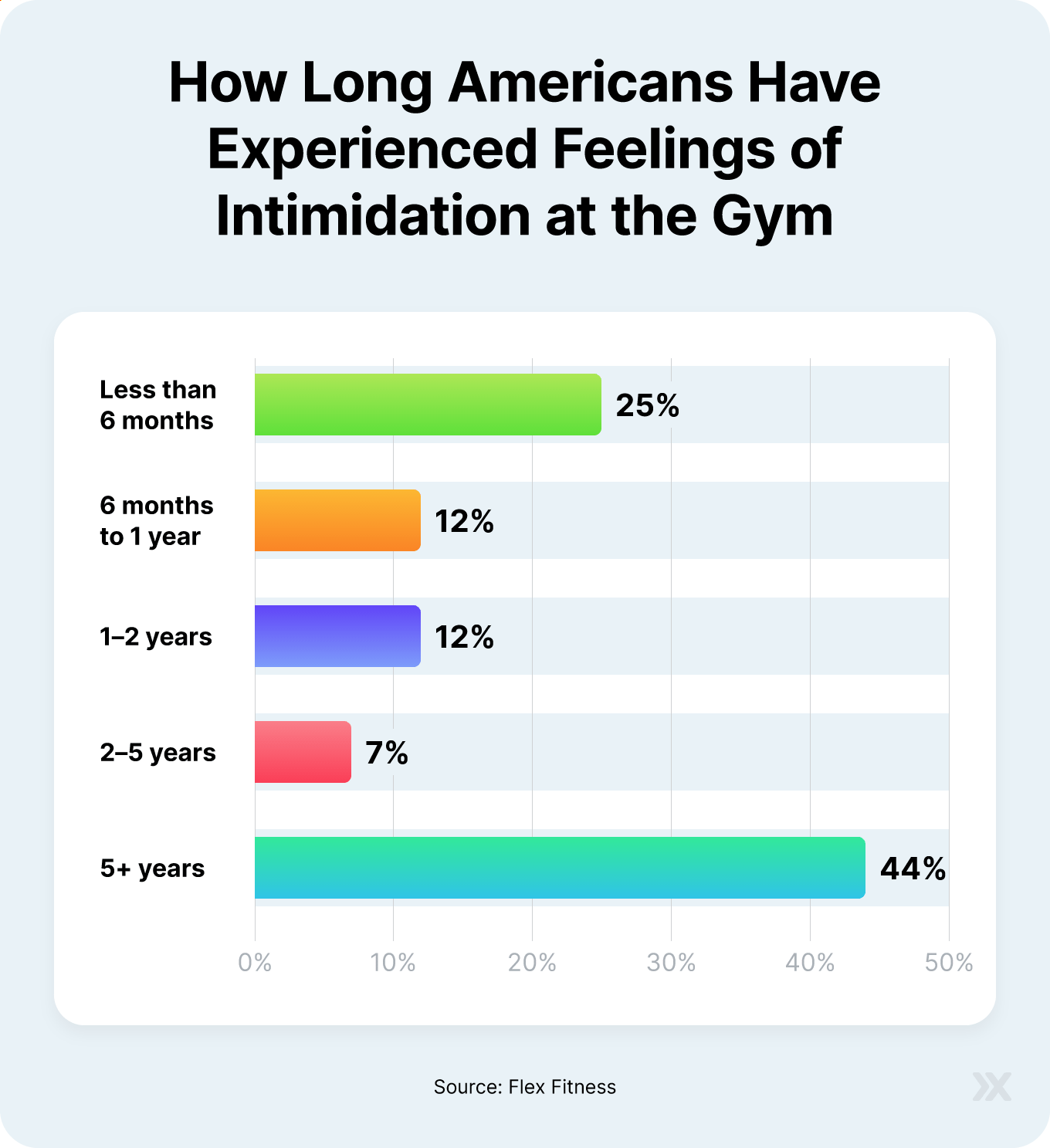
The Majority of Americans Believe Weightlifting Is the Most Intimidating Exercise
Our data reveals that weightlifting is the most daunting exercise for most survey respondents.
Interestingly, this fear of the weight room is more common among men, with 25% saying they're intimidated by weightlifting, compared to 18% of women. This might challenge the stereotype that women are more hesitant to enter the male-dominated weight area. However, when it comes to running, both genders experience similar levels of intimidation.
Age also plays a role in weightlifting gymtimidation. Older generations, particularly those over 60, are less intimidated by weightlifting than younger folks.
Our study also reveals that running and group classes are tied as the second most intimidating exercises. This means gym anxiety can appear throughout the gym — regardless of whether it’s the cardio area, free weights, or a structured class environment.
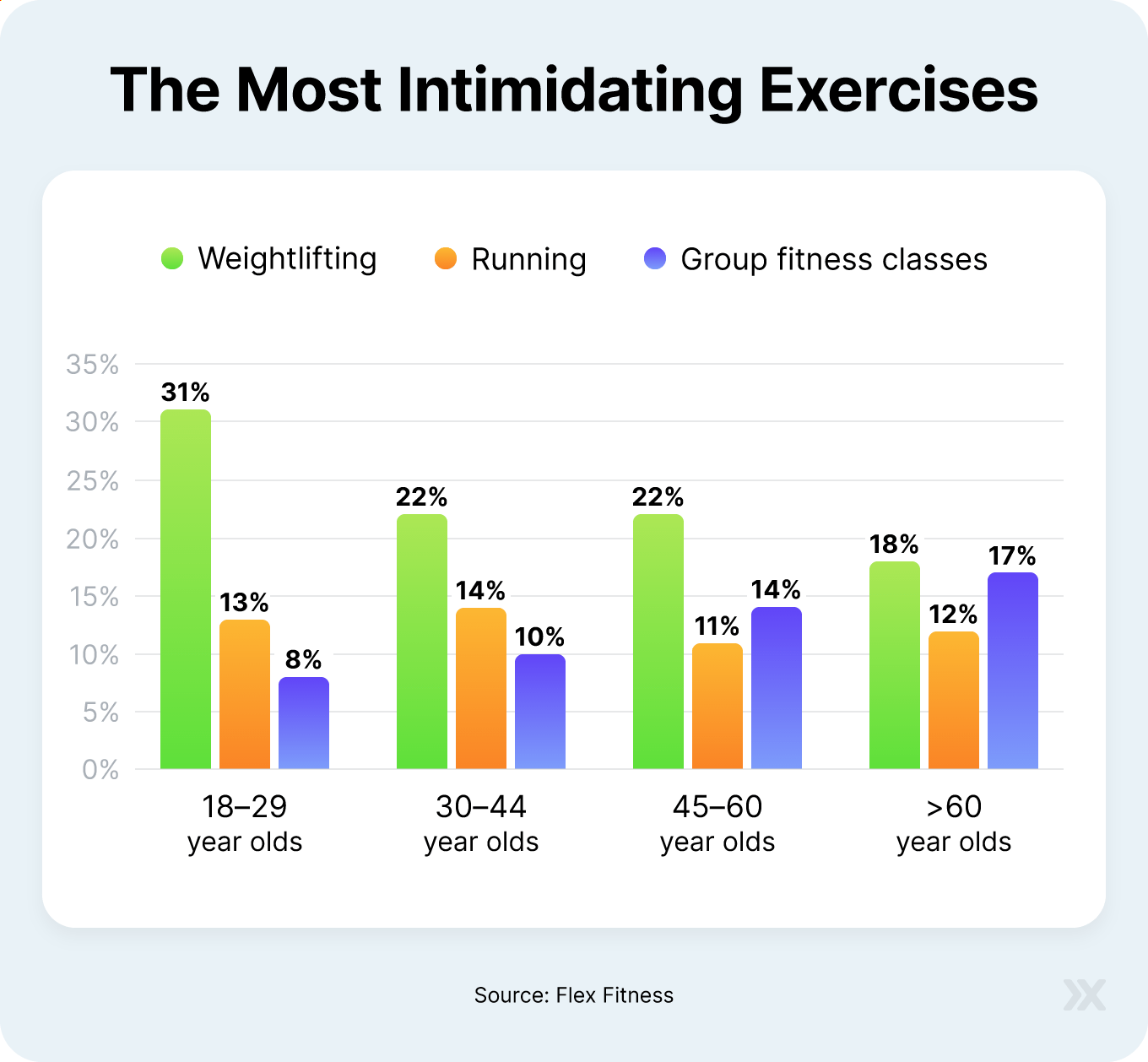
Half of Millenials and Gen Z Stopped Going to the Gym Because They Felt Intimidated
Gymtimidation is more than an inconvenience — it can actually cause people to not go to the gym. In fact, over half of individuals ages 18-29 have stopped going to the gym altogether because they felt intimidated.
Several factors contribute to this feeling of gym anxiety. Feeling judged by others on their appearance or fitness level is the most common concern. The gym environment itself can also be overwhelming, with the sheer number of people, the noise, and unfamiliar equipment adding to the anxiety.
However, almost 1 in 4 people believe finding a less crowded gym would make them feel more comfortable. Our survey also revealed that nearly 1 in 4 males believe having a gym buddy would make them feel more comfortable working at a gym.
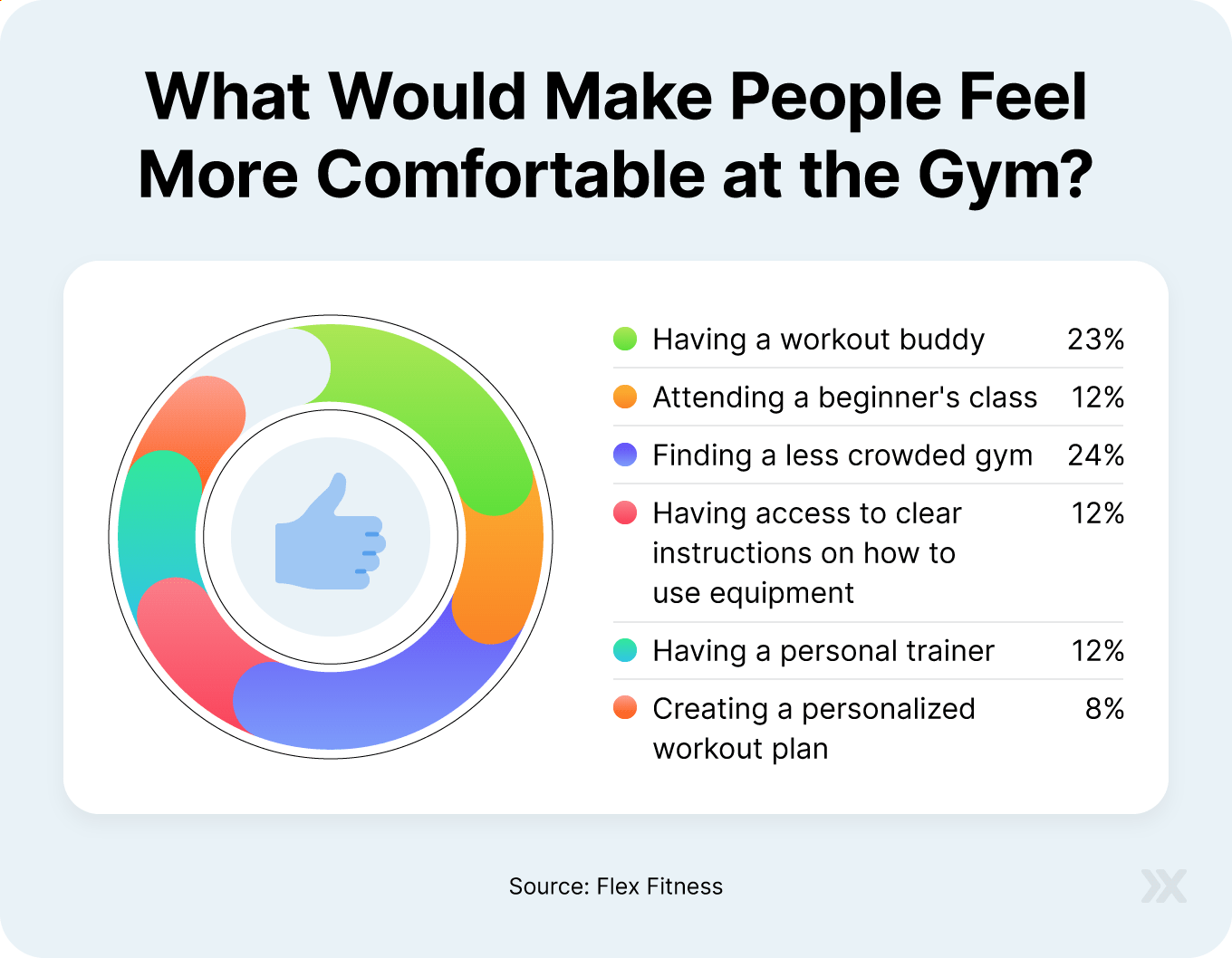
What Causes Gymtimidation?
Stepping into the gym can feel daunting — unsure where to go, how to use the equipment, and feeling claustrophobic with the crowds. But what exactly is causing these feelings of intimidation and self-consciousness? Let’s take a closer look at some of the causes of gymtimidation.
1. Fear of Judgment
The fear of being judged by others is one of the most common causes of gymtimidation. This fear can manifest in a few ways, including:
- Appearance: Concerns about wearing the "right" clothes, not looking fit enough, or feeling self-conscious about body image
- Fitness level: Worrying about not being strong enough, not knowing proper form, or comparing yourself to more experienced gymgoers
2. Lack of Knowledge and Confidence
Unfamiliar equipment, compound exercises, and being among experienced gymgoers can create a sense of overwhelm and inadequacy. This lack of knowledge and confidence can be a major contributor to gymtimidation.
Here are some aspects that can contribute to this feeling:
- Not knowing how to use the equipment: Fear of looking foolish or injuring yourself due to improper use of machines or weights
- Uncertainty about workout routines: Not knowing how to start going to the gym, how to structure a workout, or which exercises to choose
- Feeling lost in the gym environment: Uncertainty about gym etiquette, where to find things, or how to navigate the space
3. Social Anxiety
For some, the gym environment itself can be a trigger for social anxiety. The presence of many people, potential social interaction, and the feeling of being "on display" can create discomfort.
Here are some ways social anxiety might manifest in the gym:
- Feeling self-conscious: Worrying about being watched or judged by others while working out
- Difficulty asking for help: Hesitation to approach staff or trainers for assistance or clarification
- Preference for solitude: Avoiding group classes or busy times due to a desire to exercise alone
4. Other Factors
While fear of judgment, lack of knowledge, and social anxiety are significant contributors to gymtimidation, there are other factors that play a role:
- Cost of gym memberships: Financial concerns can be a barrier for some, making the gym seem inaccessible or creating pressure to "get their money's worth."
- Lack of time: Busy schedules and time constraints can make it difficult to prioritize gym visits, leading to feelings of guilt or inadequacy.
- Health concerns: Individuals with underlying health conditions or injuries may feel anxious about exercising in a public setting or unsure how to modify workouts to suit their needs.
- Negative past experiences: Previous negative encounters at a gym, such as feeling unwelcome or judged, can create lasting apprehension.
- Unrealistic expectations: Comparing yourself to others or feeling pressured to achieve unrealistic fitness goals can lead to discouragement and self-doubt.
How to Overcome Gymtimidation
Gymtimidation is common, but it doesn’t have to hold you back from hitting your fitness goals. Here are a few ways to overcome gym anxiety.
1. Educate Yourself
The more you know about fitness and the gym environment, the less anxious you'll feel. Start by researching different types of exercise, workout routines, and proper form.
Try this: Enlist help from the Flex Fitness app, which has lots of exercise information to ensure you have proper form and are targeting the right muscles.
2. Create a Comfortable Environment
Building a safe and comfortable environment can help reduce feelings of gymtimidation. Not all gyms are created equal — some gyms have a more intense, competitive atmosphere, while others are more relaxed and welcoming.
Try this: Visit different gyms in your area and find the best gym membership for you. Consider factors such as the size of the gym, the types of equipment available, the cleanliness, and the overall vibe.
3. Build Confidence
Confidence is key to overcoming gymtimidation. The more comfortable you feel in the gym environment, the less intimidating it will seem.
Try this: Start by focusing on small, achievable goals. Perhaps you begin with a simple 30-minute workout routine or familiarize yourself with a few basic machines. As you achieve these goals, your confidence will grow, and the gym will start to feel less daunting.
4. Focus on Your Own Journey
It's easy to compare yourself to others in the gym, especially when you’re surrounded by people who seem fitter or more experienced. However, remember that everyone's fitness journey is unique.
Try this: Shift your focus inward. Concentrate on your own goals, your own progress, and your own personal best. Celebrate your achievements, no matter how small they may seem. Remember why you started this journey in the first place.
Build Confidence with Flex Fitness
Overcoming gymtimidation is a journey, not a destination. It's about building confidence, gaining knowledge, and creating a comfortable environment for yourself.
And thankfully, you don't have to do it alone! Flex Fitness is here to support you every step of the way. Our free workout app provides a wealth of resources to help you conquer your fears and achieve your fitness goals. Explore our video guides and exercise pages to familiarize yourself with different exercises and equipment. Together, we can overcome gymtimidation.
Ready to take the next step? Download the Flex Fitness app today and start building your confidence!
Methodology
The survey of over 1,000 adults ages 18+ was conducted via SurveyMonkey Audience for Flex Fitness on January 16, 2025. Data is unweighted and the margin of error is approximately +/-3% for the overall sample with a 95% confidence level.
Related articles
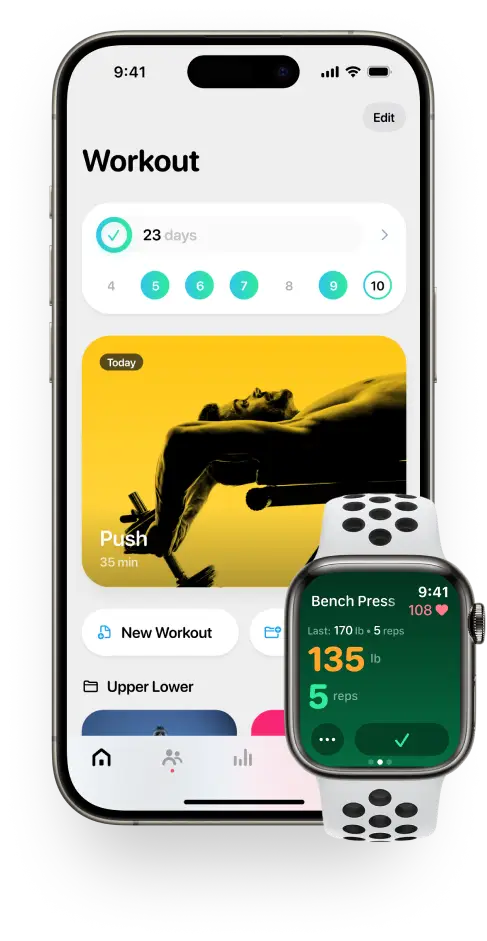

Get fit with Flex
Build muscle & lose weight fast for free.
Available on iPhone + Apple Watch
